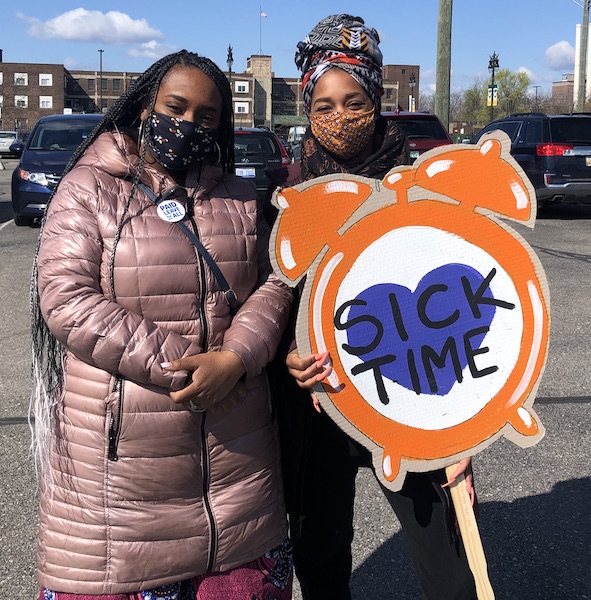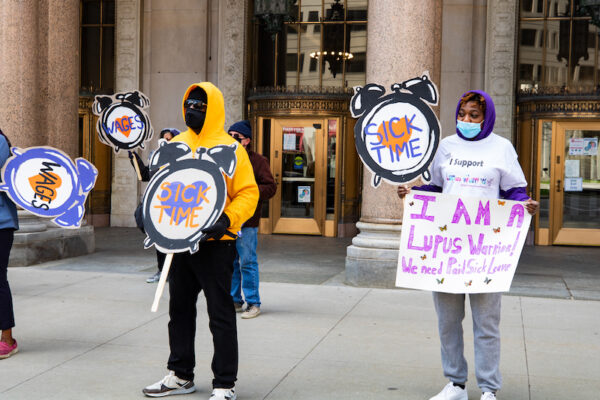
DETROIT, Mich.—A coalition of working mothers and restaurant workers are mounting a campaign to get Michigan Attorney General Dana Nessel to reverse the Republican legislators’ scheme that gutted ballot initiatives to raise the minimum wage and mandate paid sick leave in 2018.
“We are in a pandemic, and we are still talking about whether people should have paid sick time,” Danielle Atkinson of Mothering Justice said in an online town hall Apr. 20 organized by the Michigan Time to Care campaign.
The campaign, led by Mothering Justice and the Restaurant Opportunities Center of Michigan worker center, is also backed by SEIU Michigan. Mothering Justice concentrates on paid sick leave, and ROC on the minimum wage, says ROC Michigan organizer Sarah Coffey.
The two initiatives—one to raise the minimum wage from $9.25 to $12 an hour by 2022, one to enable workers to earn up to 72 hours of paid sick time a year—both qualified for the ballot in August 2018. But under Michigan law, the state legislature has the power to adopt ballot initiatives before they go to the voters. The legislature’s Republican majority did so—and then, after the election that November, returned to amend them in a lame-duck session.
The original sick-leave initiative would have required employers with 10 or more workers to give them up to 72 hours a year of paid sick time, earned at a rate of one hour for every 30 hours they worked. The amended version cut that to 40 hours, earned at a rate of one for every 35 hours worked. It also exempted employers who have less than 50 workers, and excluded part-time workers who put in less than 25 hours a week.
Those changes, Mothering Justice executive director Eboni Taylor estimates, denied sick leave to 1.7 million workers in Michigan.
The amended minimum-wage law reduced the increases to 20-26 cents a year, so it wouldn’t reach $12 until 2030, and deleted the provision repealing the subminimum wage for tipped workers. It also cancelled the annual increase if unemployment over the previous year had averaged 8.5% or more — a provision that kicked in this January, preventing the minimum from going from $9.65 to $9.87.
The strategy was obvious. The Michigan Restaurant & Lodging Association trade group boasts on its Website that it “worked tirelessly with the Michigan legislature to have them adopt the MI One Fair Wage Ballot Proposal and prevent it from going to the ballot.” Both the minimum-wage and paid-sick-leave measures “would have passed with overwhelming support” if they’d gone to voters, it adds, and then the legislature would have needed a three-fourths majority to alter them. But because the legislature “took the necessary steps to prevent this job-killing mandate from reaching the ballot,” it could amend it with only a simple majority.
“They literally stripped us of our democratic power,” state Rep. Abraham Aiyash (D-Hamtramck) said during the town hall.
Paid sick leave is especially important for people with chronic illnesses, said Christina Hayes, 33, who was diagnosed with lupus when she was 19.
“I learned what it’s like fighting to get a day off for a doctor’s appointment,” she said. She missed several appointments for blood tests because she had to work, she added. Eventually, “my health made the choice for me. I passed out at work.”
In the COVID-19 epidemic, “a lot of people are not going to bounce back,” said Tia Marie Sanders, a mother of two from the Detroit suburb of Novi who missed eight weeks of work when she got sick.
Legal questions
Was the legislative legerdemain of adopting and amending the initiatives legal? “It was already unconstitutional,” says Sarah Coffey.
The key legal question is whether the “adopt and amend” process was permitted by the section of the state constitution that governs ballot initiatives, which says initiatives approved by the voters cannot be amended until a “subsequent session.” The guiding opinion then in effect, issued in 1964 by the late state attorney general Frank J. Kelley, said that the legislature has the power to amend initiatives it’s adopted — but not during the same session.
Initiatives enacted into law by the legislature “are subject to amendment by the legislature at a subsequent legislative session,” Kelley wrote. “It is equally clear that the legislature enacting an initiative petition proposal cannot amend the law so enacted at the same legislative session without violating the spirit and letter of Article II, Sec. 9 of the Michigan Constitution of 1963.”

But in December 2018, while the amended measures were awaiting then-governor Rick Snyder’s signature, then-attorney general Bill Schuette issued an opinion that said Kelley was wrong, and the legislature did have the power to amend initiatives it adopted at any time. He argued that the constitutional limits applied only to those passed by popular vote.
There was a clear political imperative for the GOP legislators to rush their amendments through before the 2019 session. If they had waited, their changes would have likely faced a veto from the incoming governor, Democrat Gretchen Whitmer.
In early 2019, the legislature asked the state Supreme Court to give an advisory opinion on whether the amendments had been legally enacted. In December 2019, the court said that it would not rule on the question unless there was a lawsuit challenging them.
Attorney General Nessel was co-counsel for the side arguing that the amendments had been unconstitutionally enacted, says Coffey, but since the non-ruling, “she has not chosen to do anything about it.”
On Apr. 22, about 40 people organized by Michigan Time To Care rallied outside the Attorney General’s office in Detroit, planning to deliver messages urging Nessel to revoke Schuette’s opinion. They were unable to do so because the office was closed because of the pandemic.
“What we really ultimately want is for her to be on our side,” Coffey told LaborPress afterwards. “We understand that she’s a supporter, but if we don’t bring the urgency, no one will.”
“The question of constitutionality was brought before the Michigan Supreme Court for consideration and was declined,” Nessel’s press secretary, Lynsey Mukomel, said in a statement to LaborPress. “The Attorney General was disappointed by the court’s choice not to consider the question.”
Does she plan to take any further action on the issue? “Not at this point in time,” the Attorney General’s office responded.
The other avenue for changing the law would be legislation. Last June, state Sen. Erika Geiss (D-Wayne County) introduced a bill with sick-leave provisions similar to those of the 2018 initiative, with added clauses related to pandemics. It did not get a hearing in the Senate, where Mike Shirkey (R-Clarklake), sponsor of the 2018 bill to cut paid sick leave, is majority leader. (Shirkey, who was also a prime mover behind Michigan’s ban on the union shop, enacted during another lame-duck session in 2012, got brief national notoriety this February when he told a Republican county committee that the Jan. 6 assault on the Capitol was “not Trump people” and was a hoax “that was all prearranged.”)
“We never even got a response to the request for a hearing,” Geiss told the press conference.
If the paid-sick-leave law had been in effect when the COVID-19 virus hit, “we would have had more people able to take care of themselves, to quarantine,” she said. “It’s still a problem, and it needs to be fixed.”



